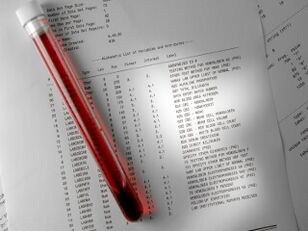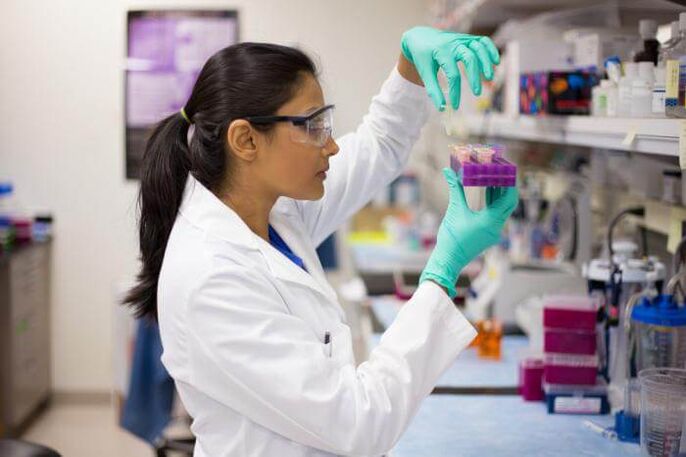
To date, there is no reliable diagnostic method that would give a hundred percent results concerning pathogens of the disease and the degree of activity of the process.Compared to other methods, a blood test for parasites is the most precise.It is only in this way that information can be obtained on the presence of a particular microorganism, whatever the cycle of its vital activity of the formation of the egg and the larva to an adult.
Why is the exact diagnosis of helminths important?Almost all the antiparasitic agents presented on the pharmaceutical market have a wide range of activities compared to different groups of worms.
However, the treatment period differs, depending on the type of disease, it can be 1 day to several months.At the same time, helminths affect the work of the whole human body.
Their development is accompanied by physiological changes such as:
- Desensitization (constant allergic reaction).
- Persistent lack of vitamins and various elements.With the parasitic invasion, the structure of the epithelial intestinal cells is damaged, therefore, the absorption of various nutrients is disturbed.
- Changes in the hormonal background.
- Holy disturbances (this is also reflected in the usual blood test).Increase in vascular permeability.
- The development of chronic digestive pathologies (liver disease and bile ducts, inflammation of the pancreas, intestines), endocrine (diabetes), of the bronchopulmonary system (bronchial asthma).
- Exacerbation of allergic diseases.
- Emotional disorders (chronic fatigue, irritability, mood mood, insomnia, constant alarming, pathological hyperactivity).
- Difficult exercise in diseases caused by viruses and infections due to immunodeficiency.
Confirmation of the diagnosis by a blood test from the vein on the parasites is also recommended when specific symptoms of Helminthiasis appear.Let us be around the most common.The infection possible by ancients (enterobiosis) is highlighted by itching in the anus area, increasing considerably in the evening and at night.Its intensity depends on the power of the invasion.Sometimes it is not limited to the anus, but applies to external genitals.Constant combing can cause infectious complications.
The invasion of the blazothal (trichocephalous) is accompanied by general discomfort, increased fatigue, pain in the right iliac region, diarrhea is constantly replaced by constipation, sometimes a blood of blood in the excrement is noted.Fortyloidosis takes place with constant temperature fluctuations, rashes on the chest, buttocks, abdomen, lower back and hips, diarrhea of stench (up to 7 times a day).
Signs of trichinellosis are symptoms of acute poisoning, facial swelling, severe muscle pain.It is dangerous to overcome almost all internal organs and the central nervous system.Toxocarosis is also characterized by the night -up cough.Sometimes toxocar larvae penetrate the brain with a blood flow.In this case, the patient may have convulsive crises and other neurological symptoms.
Almost all parasites are characterized by a set of clinical signs, consisting of:
- pain and rumble in the abdomen;
- nausea, less often - vomiting;
- stool violations;
- flatulence;
- Allergic manifestations.
Currently, the most common method for diagnosis of Helminthiasis is a serological immuno-orable blood test for parasites detection.The decoding of this study is based on the detection of certain antibodies, which are produced in response to the antigens of the foreign microorganism.
The advantage of immunoformal analysis (ELISA) is its versatility.Such a technique applies to the diagnosis of worms in an adult and a child.Treatment with various drugs has no significant effect on results.The only thing that can affect the production of antibodies is the state of immunodeficiency.In addition, this blood test for parasites is complete, that is to say that several pathogens can be identified at the same time
How to check the parasites, what tests to pass, the preparation of the research

How to check the parasites, what tests can be given in the clinical and diagnostic center.Now they offer many packages for complex diagnoses, which include research on all helminthes and common protozoa.His conduct does not require special training.
But to obtain reliable results, doctors recommend that they do not eat 8 to 10 hours before analysis, blood in the morning strictly in an empty stomach in the morning.In addition, it is advisable to abstain from fatty and sweet foods, alcohol.Stress, intensive physical effort should be avoided.If the use of drugs falls at the beginning, you should transfer it for several hours and drink it after analysis.
The blood fence is made of vein.To conduct the study, 1-3 ml is enough.Then the nurse asks to bend her hand at the elbow and stay in this position for 10 to 15 minutes.This is necessary to prevent the formation of a bruise.The result will be ready in 3 to 5 days.
In the medical literature, the IFA methodology is described using a specific terminology, which is simply incomprehensible for an appropriate education without education, which is simply interested in how to check the parasites, what tests to pass.
Under the conditions of the laboratory, they take a special tablet with cells in which an antigen of a certain parasite is pre-introduced.A small amount of blood serum is added.Then, using the devices, photometry is carried out, during which specific markers are assessed.The "classic" study includes: Giardia, Toxoplasmes, Trichomonas, all pathogens of Helminthias (ANCS, Ascarides, Toxocars, Echinococci, Opistarchy, Trichinella).
Following Elisa, three types of antibodies can be distinguished:
- Igm, detect 2.5 to 4 weeks of infection;
- Iga, is produced from the first days of the disease and is determined until healing;
- Igg, discovered from 4 weeks from the disease, a decrease in titles only occurs after 1-1.5 months after recovery.
The conclusion on the presence of a parasitic infection is made on the basis of the report of these antibodies.Their absence indicates that there is no Helminthic invasion.The specificity and reliability of the ELISA are approximately 90%.
The probability of falsely positive and false negative results occurs in various failures in the functioning of the immune system.Therefore, during the diagnosis, not only is ELISA data taken into account, but also a clinical image.If necessary, the patient is sent for additional examinations.
Analyzes of parasites in adults and children

There are other ways to identify the Helminthic invasion.
The presence of such a disease can be assumed by a general blood test.
They pay attention to signs such as a long term, which lasts several months, an increase in the level of eosinophiles (normal values fluctuate at less than 1 to 5%), with certain types of anemia anemia is possible (by reducing the concentration of hemoglobin).
A common analysis of parasites in a child is a scratch known for an entire enterobiosis.
To do this, immediately after waking up, without getting out of bed and washing, it is necessary to push the buttocks and fix a piece of ribbon to the anal opening and the skin around it.Then, it is glued to the article and for 1.5 hours is allocated to the laboratory.
But this study allows you to determine a single type of parasite.It is absolutely not suitable for identifying the lambie and other protozoa.Calais analysis is more indicative.In this case, you can detect Ascaris larvae and different lines, pathogens of Helminthiasis, parasites in the intestine.But a negative result does not always mean the absence of a disease.Therefore, for a reliable diagnosis, various parasites tests in a child are necessary.
A negative analysis of the excrement can prove if the worms have not yet reached the last parts of the digestive system or if they have already passed the propagation cycle.Some drugs can also influence data.Therefore, it is recommended to repeat the study after a few days.
But the most reliable analysis of parasites in an adult and a child is the diagnosis by chain reaction by polymerase or by the abridged PCR.At the same time, experts determine the DNA of the pathogen in the patient's blood.It is clear that with this method of study, the probability of false data is negligible.The analysis will give a specific result even to the initial stages of the invasion.
Usually the PCR is prescribed to confirm the diagnosis.The widespread use of this method with a preventive objective limits the high cost.In adults, testimonies of the examination on parasites are problems of immunity, general deterioration of the well, the temperature of unclear etiology, cough and other symptoms of helminthiasis.However, it is recommended to start diagnoses with an ordinary fecal analysis, which can be put back in any clinic.
Important!Treatment should only start after testing parasites in adults have been carried out and the confirmation of the Helminthic invasion has been obtained.Taking medication in the event of suspicion of a parasitic infection can cause serious complications.
Medical recommendations differ in a relatively early diagnosis of these diseases in childhood.It is necessary to take a scratching in enterobiosis and excrement on the egg player twice a year.These parasitic tests in a child are necessary before visiting the garden and the school.And in no case should be forgotten of prevention, which amounts to a frequent washing of the hands corresponding to the treatment of food and the quality of drinking water.
























